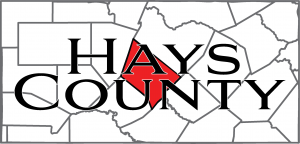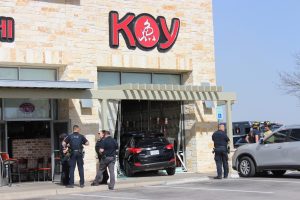By Moses Leos III
Two people were injured Sunday after their SUV was struck by a Union Pacific train following the driver’s attempt to bypass railroad crossing arms at the Roland Lane crossing in Kyle.
Buda resident and driver Wesley Smith, 46, and passenger Mark Andrews, 33, were transported to University Medical Center Brackenridge in Austin for observation. Both suffered minor injuries. No one on the train suffered injuries in the accident.
According to Kyle Police Department chief Jeff Barnett, his department is considering charges against Smith because disregarding railroad crossing signage and warning equipment is a violation of state law.
The incident occurred at approximately 4:15 p.m. Sunday. According to a Kyle police accident report, the vehicle, a 2005 maroon Dodge Durango, was traveling west on Roland Lane when it approached the railroad tracks.
Both the railroad crossing arms and signal lights indicated an approaching train. However, Smith disregarded the signals, and failed to stop for a northbound Union Pacific locomotive. According to Union Pacific spokesperson Jeff Degraff, the locomotive was carrying finished automobiles from Laredo to Chicago.
Smith drove around the crossing arms, but was struck in the back end by the train. The resulting impact shoved the Durango 100 feet north of the intersection.
Degraff said the train’s conductor initiated an emergency stop before striking the vehicle. However, he said large trains need several thousand feet to come to a complete stop.
“He (the conductor) had enough time to start the braking process, but unfortunately, it didn’t come to a complete stop,” Degraff said.
According to Barnett, Kyle Police officers and the Kyle Fire Department were dispatched to the crossing.
Upon arrival, officers found both occupants of the vehicle were walking around and talking to emergency crews; they were ultimately transported to the hospital.
Both driver and passenger were wearing seatbelts, and no airbags were deployed in the collision. The locomotive took minimal damage. It is unknown at this time how fast the train was going.
It took roughly three hours to clear the accident.
According to Degraff, delays lasting three hours or less wouldn’t force Union Pacific to divert any trains. He said Union Pacific would have slowed incoming trains to “keep spacing appropriate.”
Detouring routes would only be necessary in major accidents that cause delays of six hours or more.
“That’s when we have to start detouring trains,” Degraff said. “In this case, we didn’t see that.”










